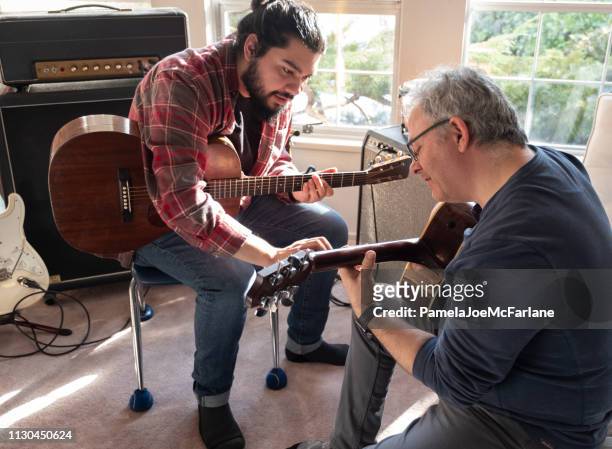In the rapidly evolving landscape of technology, artificial intelligence (AI) has found its way into nearly every aspect of our lives, from healthcare to transportation, and now, even music education. Among the most exciting developments in this field is the emergence of AI guitar teachers, revolutionizing how aspiring musicians learn and hone their skills.

The Evolution of Music Education
Traditionally, learning to play the guitar involved one-on-one lessons ai guitar teacher with a human instructor, self-study with books or videos, or attending music schools. While these methods have proven effective for many, they come with their own set of challenges, including high costs, inflexible schedules, and varying quality of instruction. AI guitar teachers address these issues by offering an accessible, affordable, and personalized learning experience.
How AI Guitar Teachers Work
AI guitar teachers leverage advanced technologies such as machine learning, computer vision, and audio analysis to provide a comprehensive learning platform. Here’s a closer look at the key components:
- Interactive Lessons: AI platforms offer structured lessons that adapt to the learner’s skill level and pace. These lessons can cover a wide range of topics, from basic chords and scales to complex soloing techniques and music theory.
- Real-time Feedback: Using computer vision, AI guitar teachers can analyze a student’s hand positioning, strumming patterns, and finger movements in real time. This allows for instant feedback, correcting mistakes as they happen, much like a human instructor would.
- Audio Analysis: By analyzing the audio output from the guitar, AI can detect whether the notes and chords are being played correctly. This feature is particularly useful for developing a good ear for music and ensuring that learners stay in tune.
- Personalized Learning Paths: Machine learning algorithms track a student’s progress and adjust the difficulty and focus of lessons accordingly. This personalized approach ensures that learners remain engaged and challenged without becoming overwhelmed.
- Gamification: Many AI guitar teaching platforms incorporate gamification elements, such as rewards, levels, and challenges. This not only makes learning more fun but also helps to motivate students to practice regularly.
Benefits of AI Guitar Teachers
- Accessibility: AI guitar teachers are available 24/7, allowing learners to practice and take lessons at their convenience. This is particularly beneficial for those with busy schedules or those living in areas without access to quality music instruction.
- Affordability: Compared to traditional lessons, AI guitar teachers are generally more affordable. Many platforms offer free basic versions with the option to subscribe to premium features, making quality music education accessible to a broader audience.
- Consistency and Patience: Unlike human instructors, AI guitar teachers are endlessly patient and consistent. They can repeat lessons and exercises as many times as needed without frustration, providing a supportive learning environment.
- Data-Driven Insights: AI can track detailed metrics on a learner’s progress, identifying strengths and areas for improvement. This data-driven approach helps learners focus their practice more effectively.
Leading AI Guitar Teaching Platforms
Several companies have developed impressive AI-driven guitar teaching platforms. Some of the leading names in the industry include:
- Yousician: This popular app uses audio recognition to provide real-time feedback and offers a wide range of lessons for different skill levels and musical styles.
- Fender Play: Backed by the renowned guitar manufacturer Fender, this platform combines video lessons with AI-driven feedback to create a comprehensive learning experience.
- Jamstik: Known for its smart guitars that connect to an app, Jamstik offers interactive lessons and real-time feedback, making it a great tool for beginners.
The Future of AI in Music Education
As AI technology continues to advance, the capabilities of AI guitar teachers are expected to grow. Future developments may include more sophisticated audio and video analysis, deeper integration with music theory, and even AI-generated personalized compositions for practice. Additionally, the social aspect of learning can be enhanced through AI, with virtual group lessons and AI-driven community platforms where students can share their progress and collaborate with others.
Conclusion
AI guitar teachers represent a significant leap forward in music education, providing a flexible, affordable, and highly personalized learning experience. While they may not completely replace human instructors, they offer a valuable supplement to traditional methods, making guitar learning more accessible and engaging for everyone. As technology continues to evolve, the future of music education looks bright, with AI playing a key role in shaping the next generation of musicians.